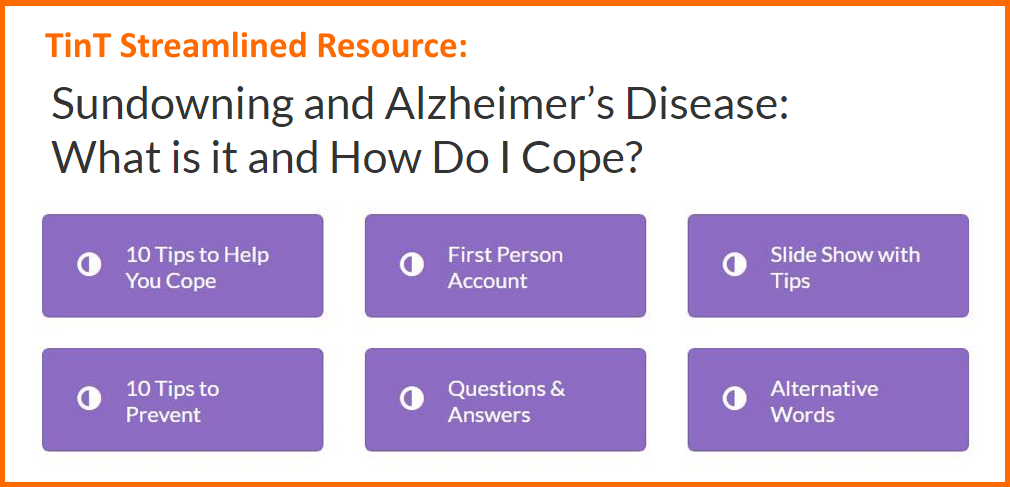
Editor’s Note: The term “Sundowning” is sometimes used as a negative label which can be damaging to the care provided, and results in unjust stereotyping. This contributes to approaches to care that focus on weakness rather than strength, illness rather than wellness, and victims rather than whole persons. It’s important, as the author states, to look at any behaviors as a form of communication. This will help you discover, and hopefully, address the trigger that is negatively affecting your loved one. Learn More.
Contributing Writer: Christy Turner, founder of Dementia Sherpa
Sundowning can be one of the scariest things you encounter as a dementia care partner. Everything seems to be going well, and then, seemingly out of the blue, your person goes into full meltdown mode.
What happened?
Depending on the time of day, it’s probably sundowning.
Sundowning refers to behaviors that occur late in the day; hence, the name. This can include any type of behavior. The common element is how difficult it is to “reach” your person, as they may seem inconsolable.
Keeping in mind that “behaviors” is just another word for “communication” can help make it a less scary experience.
Remember that for people living with dementia, it’s easier to understand our nonverbal cues and body language than our words, so do your best to stay calm throughout the experience.
Here’s what else to do:
1. Maintain visual supervision. Depending on the severity of the situation, you probably shouldn’t get inside their personal bubble. Safety is the first priority, so just do what you need to do to maintain that, without being intrusive.
2. Once sundowning has started, it’s very difficult to stop. If caught early enough, you can try distraction and redirection.
Understand that in order to fully stop it, you’ll need to be completely engaged with your person for the next few hours.
Using the television usually won’t work.
3. Turn on all the lights and cut off other stimulation. This decreases confusion both about the time of day, as well as helps with visual hallucinations and visual-spatial impairments. Cutting off overstimulation (TV, radio, people talking) is one of the smartest, most effective things you can do.
4. Match your tone and pitch to your person’s. This isn’t to say yell back, but if they’re throwing out a heavy-metal kind of energy, you bringing a Lawrence Welk vibe is just going to irritate.
5. Whip out the lavender or geranium essential oils. Either of these in a diffuser can be super useful in promoting calm. Also consider spraying some on a shirt collar.
6. Burn off the energy. Any type of physical activity will be helpful in using up the sundowning energy.
7. If it’s safe, offer physical affection. Hugs make everyone feel better, but if that’s not possible offer your hand (palm up, a sign of submission) to hold.
8. Synchronize your breathing. If it’s safe to get close enough, synchronize your breathing. Once synced, work toward deep breaths and long exhales.
9. Please don’t be a jerk! This only happens unintentionally, but it’s still not cool. Think of a time when you were angrier and more frustrated than you’ve ever been in your life.
Now, think of your parent or partner telling you to “just calm down” or “relax” or assuring you that “you’re fine” and “there’s no need to be so upset.”
Helpful? Nope! You probably felt your blood pressure go up even more, right? Same goes for people living with dementia. We all like to be taken seriously and have our feelings validated.
10. Be a hero. Remember, as scary as this is for you, it’s even more terrifying for a person living with dementia.
They don’t know why this is happening, they can’t verbally express their thoughts and feelings, and they’ve lost the ability to self-soothe.
You make it okay for them by stepping into their reality and offering reassurance: “I’m here for you. I love you. I’m going to keep you safe.
I’m not going to let anything bad happen to you. I will always protect you.”
 About the Author: Christy Turner is the founder of Dementia Sherpa. She’s helped over 1100 through the rough terrain that is dementia.
About the Author: Christy Turner is the founder of Dementia Sherpa. She’s helped over 1100 through the rough terrain that is dementia.
Be sure to visit her site, and learn more about her and her great resources at DementiaSherpa.com.
Click here for her complimentary guide, Communication Tips & Strategies for Dementia Care Partners.
If you like what you’ve read, why not receive periodic updates when you:
Subscribe to the TinT Newsletter
Have you experienced sundowning with your loved one? Please share your experience or questions in the comments below:






Early anticipation – start the lighting way before it gets dark. Blinds drawn. Find the TV music program or You Tube, background light, low music, distract patient with a refreshing drink, fragrant back rub always helps. Do not leave the patient; refresh with a cold compress. Try to keep them awake in the afternoon so they can sleep through sundowning. No set pattern – try different measures to find the right one that eases the problem. Please no morphine.
Thank you for the really good additional tips Norman.